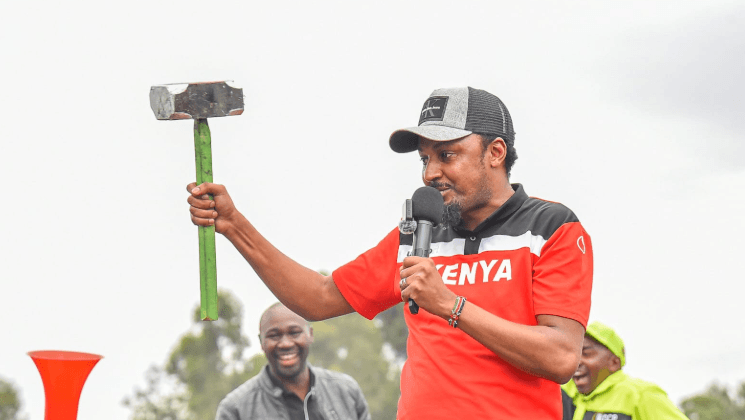We're loading the full news article for you. This includes the article content, images, author information, and related articles.
Kiambu Senator Karungo wa Thang'wa has pledged to escalate the issue of Kenyan mothers and children stranded in Saudi Arabia to Parliament, citing government negligence and severe bureaucratic delays in repatriation processes.

Kiambu Senator Karungo wa Thang'wa has announced his intention to take parliamentary action following his recent visit to Saudi Arabia, where he witnessed firsthand the dire conditions of Kenyan mothers and their children stranded in the Kingdom. In a series of statements issued between Sunday, November 13 and Sunday, November 16, 2025, the senator accused the Kenyan government and its embassy in Riyadh of negligence and failing to protect its most vulnerable citizens abroad.
"No government statement, however well-written, can neutralize the reality I saw with my own eyes. The suffering is real. The neglect is real," Thang'wa stated on Sunday, November 16, describing scenes of mothers and children sleeping on cold pavements, undocumented and abandoned. He has vowed to raise the matter in the Senate, demanding accountability and immediate intervention.
A central issue highlighted by Senator Thang'wa is the prolonged delay in processing DNA tests required for children born to Kenyan mothers out of wedlock in Saudi Arabia. This verification is a prerequisite for issuing travel documents, but the process has left many families in a state of legal and social limbo for years. One case cited by the senator involves a woman from Vihiga County who has been homeless in Riyadh with her eight-year-old daughter for years, awaiting DNA results for a sample collected three years ago.
The Ministry of Foreign and Diaspora Affairs acknowledged that 707 DNA samples were collected from Kenyan children in Saudi Arabia, but only 110 birth certificates have been processed. This leaves over 500 children undocumented. While the government suggests some mothers have not collected the documents, Thang'wa countered that many were never contacted, live too far from the embassy, or fear arrest due to Saudi laws that criminalize childbirth outside of marriage.
In response to the growing concerns, Prime Cabinet Secretary Musalia Mudavadi on Wednesday, November 13, 2025, stated that the government is pursuing bilateral interventions. He announced the formation of a Joint Interdepartmental Working Group in January 2025, which includes Kenyan and Saudi officials, to expedite the issuance of emergency travel documents. According to Mudavadi, these efforts have resulted in the repatriation of 59 mothers and 73 children.
The plight of these mothers is symptomatic of broader, systemic issues facing Kenyan migrant workers in the Gulf. Kenya is a major source of labor for the region, with over 200,000 Kenyans working in Saudi Arabia alone, primarily in domestic roles. Remittances from these workers are a significant source of foreign exchange for Kenya.
However, numerous reports from human rights organizations have documented widespread abuse. A May 2025 report by Amnesty International, titled "Locked in, left out: the hidden lives of Kenyan domestic workers in Saudi Arabia," detailed accounts of brutal working conditions, including 16-hour workdays, denial of days off, passport confiscation, wage theft, and physical, sexual, and verbal assault, which often amount to forced labor and human trafficking. The organization has called on both the Kenyan and Saudi governments to reform labor laws and dismantle the restrictive 'kafala' sponsorship system that binds workers to their employers.
Data reveals a grim reality: at least 274 Kenyan domestic workers, mostly women, have died in Saudi Arabia since 2020. The Commission on Administrative Justice (Ombudsman) in Kenya has previously investigated the shortfalls in government measures to protect these workers, highlighting failures to fully implement a 2015 bilateral labor agreement.
Senator Thang'wa's promised parliamentary intervention adds pressure on the government to address these long-standing issues. He has demanded the deployment of an emergency consular team to Saudi Arabia, the fast-tracking of all pending DNA results, and the creation of safe channels for distressed Kenyans to seek help without fear of intimidation. He also alleged that the Kenyan embassy in Riyadh has used proxies to silence those who speak out about their suffering.
Human rights groups and trade unions have echoed these calls for stronger government action. Amnesty International has urged the Kenyan Parliament to scrutinize the bilateral labor agreement with Saudi Arabia and demand an end to the abuses. The Central Organisation of Trade Unions (Kenya) has consistently advised migrant workers to register with Kenyan embassies before traveling to ensure they have access to protection and assistance. As Senator Thang'wa prepares to take the matter to the Senate floor, the focus will be on whether this renewed political pressure can translate into meaningful policy changes and better protection for thousands of Kenyans seeking livelihoods far from home.
Keep the conversation in one place—threads here stay linked to the story and in the forums.
Sign in to start a discussion
Start a conversation about this story and keep it linked here.
Other hot threads
E-sports and Gaming Community in Kenya
Active 9 months ago
The Role of Technology in Modern Agriculture (AgriTech)
Active 9 months ago
Popular Recreational Activities Across Counties
Active 9 months ago
Investing in Youth Sports Development Programs
Active 9 months ago
Key figures and persons of interest featured in this article